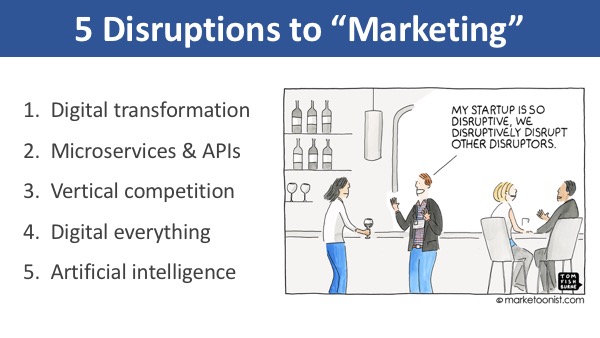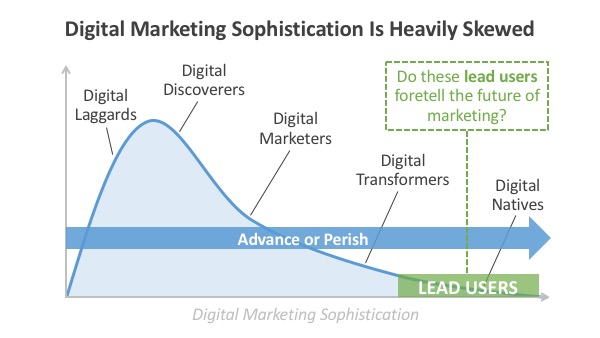5 Disruptions to Marketing, Part 1: Digital Transformation. These five disruptions are: Digital transformation redefines “marketing” beyond the marketing department. In a digital business environment, the levers that have the greatest effect on so-called marketing outcomes — growth of revenue and the brand — are not necessarily owned by the marketing department. We can glimpse what that looks like by examining businesses already operating that way today. But as you examine even more sophisticated digital marketing teams, you see that they’re often a part of broader digital transformation efforts. Sure, digital natives still have marketing departments. This poses an existential question for marketers: as their company becomes more digitally sophisticated, who will own customer experiences and control the growth levers embedded in them? Product and marketing remain separate organizationally, with product owning customer experiences and marketing’s scope contracting back to communications. Sales, customer service, billing, and product teams will all have explicit marketing components of what they do — product most of all — which they will manage themselves. The next article in this series, Part 2: Microservices & APIs, will be published soon.

This is not your typical “predictions for 2017” story. I confess, those things aren’t my cup of tea. But it is a serious call to prepare yourself for a transformative year ahead.
I believe that marketing is in the middle of five major disruptions that are reshaping our whole industry and profession. I know, that sounds like hyperbole, but it’s not. These are big tectonic shifts, and they will grow in magnitude over the next 12 months.
These five disruptions are:
- Digital transformation redefines “marketing” beyond the marketing department.
- Microservices & APIs (and open source) form the fabric of marketing infrastructure.
- Vertical competition presents a greater strategic threat than horizontal competition.
- AR, MR, VR, IoT, wearables, conversational interfaces, etc. give us digital everything.
- Artificial intelligence multiplies the operational complexity of marketing & business.
I’ll describe each one of these in more detail in their own post, starting here with Part 1: Digital Transformation.
1. DIGITAL TRANSFORMATION
Digital transformation is much bigger than marketing — it includes sales, service, products, internal operations, and so on. In many cases, it brings entirely new digital business models.
So why is this a disruption to marketing?
For many businesses, digital has simply been the domain of marketing: web marketing, email marketing, search engine marketing, social media marketing, etc. It was lightly wrapped around existing products and services. As such, marketing could operate independently from the rest of the business with a few straightforward inputs (products) and outputs (customer demand). This wrapper-like independence, by the way, enabled big chunks of marketing to be outsourced to external agencies — a model that is now in flux.
Digital transformation disrupts marketing’s isolated dominion in two ways:
- Digital is now also the concern of sales, customer service, billing, and — most importantly — the development and operations of core products and services. It requires deep, real-time collaboration between all of these departments.
- In a digital business environment, the levers that have the greatest effect on so-called marketing outcomes — growth of revenue and the brand — are not necessarily owned by the marketing department. They can be driven more by products and services teams.
In short: digital is no longer a marketing wrapper. It is infused into the core business. We can glimpse what that looks like by examining businesses already operating that way today.
Digital marketing sophistication is rather heavily skewed. Many companies are still discovering the basics of digital marketing. There’s then a long tail of more advanced marketers — the ones who have marketing technologists and impressive marketing technology stacks.

But as you examine even more sophisticated digital marketing teams, you see that they’re often a part of broader digital transformation efforts. And the most sophisticated digital marketers are the digital natives — Amazon, Facebook,…
COMMENTS